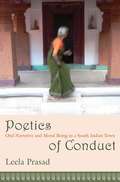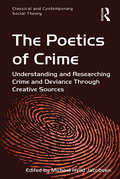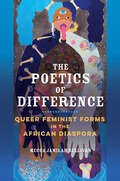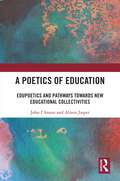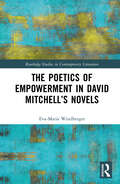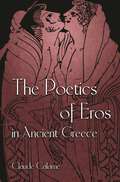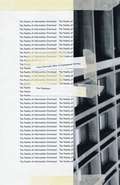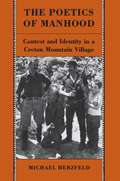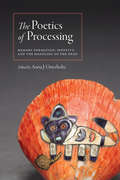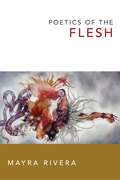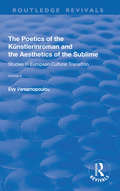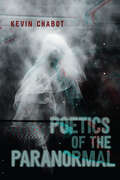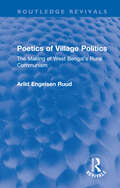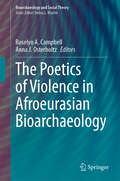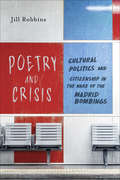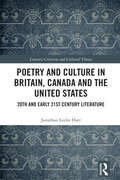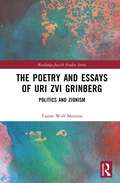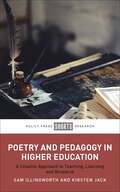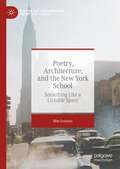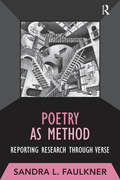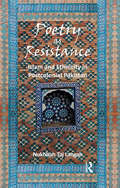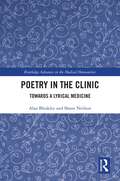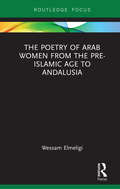- Table View
- List View
Poetics of Conduct: Oral Narrative and Moral Being in a South Indian Town
by Leela PrasadLeela Prasad's riveting book presents everyday stories on subjects such as deities, ascetics, cats, and cooking along with stylized, publicly delivered ethical discourse, and shows that the study of oral narrative and performance is essential to ethical inquiry. Prasad builds on more than a decade of her ethnographic research in the famous Hindu pilgrimage town of Sringeri, Karnataka, in southwestern India, where for centuries a vibrant local culture has flourished alongside a tradition of monastic authority. Oral narratives and the seeing-and-doing orientations that are part of everyday life compel the question: How do individuals imagine the normative, and negotiate and express it, when normative sources are many and diverging? Moral persuasiveness, Prasad suggests, is intimately tied to the aesthetics of narration, and imagination plays a vital role in shaping how people create, refute, or relate to "text," "moral authority," and "community." Lived understandings of ethics keep notions of text and practice in flux and raise questions about the constitution of "theory" itself. Prasad's innovative use of ethnography, poetics, philosophy of language, and narrative and performance studies demonstrates how the moral self, with a capacity for artistic expression, is dynamic and gendered, with a historical presence and a political agency.
The Poetics of Crime: Understanding and Researching Crime and Deviance Through Creative Sources (Classical and Contemporary Social Theory)
by Michael Hviid JacobsenThe Poetics of Crime provides an invitation to reconsider and reimagine how criminological knowledge may be creatively and poetically constructed, obtained, corroborated and applied. Departing from the conventional understanding of criminology as a discipline concerned with refined statistical analyses, survey methods and quantitative measurements, this book shows that criminology can - and indeed should - move beyond such confines to seek sources of insight, information and knowledge in the unexplored corners of poetically and creatively inspired approaches and methodologies. With chapters illustrating the ways in which criminologists and other researchers or practitioners working on crime-related questions can find inspiration in a variety of unconventional materials, writing styles and analytical strategies, The Poetics of Crime offers studies of police photography, classic and contemporary literature, silver screen movies, performative dance enactments and media images. As such, this volume opens up the field of criminological research to alternative and novel sources of knowledge about crime, its perpetrators and victims, authorities, motives and justice. It will therefore appeal not only to sociologists, social theorists and criminologists, but to scholars across disciplines with interests in crime, deviance and innovative approaches to social research.
The Poetics of Cruising: Queer Visual Culture from Whitman to Grindr
by Jack ParlettA groundbreaking new history of urban cruising through the lenses of urban poets The Poetics of Cruising explores the relationship between cruising, photography, and the visual in the work of leading poets, from Walt Whitman in the nineteenth century to Eileen Myles in the twenty-first. What is it that happens, asks Jack Parlett, and what is it that is sought, in this often transient moment of perception we call cruising, this perceptual arena where acts of looking between strangers are intensified and eroticized? Parlett believes that this moment is not only optical in nature but visual: a mode of looking that warrants comparison with the ways in which we behold still and moving images. Whether it&’s Whitman&’s fixation with daguerreotypes, Langston Hughes&’s hybrid photographic works, or Frank O&’Hara&’s love of Hollywood movie stars, argues Parlett, the history of poets cruising abounds with this intermingling between the verbal and the visual, the passing and the fixed. To look at someone in the act of cruising, this history suggests, is to capture, consider, and aestheticize, amid the flux and instantaneity of urban time. But it is also to reveal the ambivalence at the heart of this erotic search, where power may be unevenly distributed across glances, and gendered and racialized bodies are marked. Thus, in identifying for the first time this confluence of cruising, poetry, and visual culture, Parlett concludes that the visual erotic economy associated with gay cruising today, exemplified by the photographic grid of an app like Grindr, is not a uniquely contemporary phenomenon. Innovative, astute, and highly readable, and drawing on compelling archival material, The Poetics of Cruising is a must for scholars of queer and LGBTQ literature and culture, modern and contemporary poetry, visual studies, and the history of sexuality.
The Poetics of Difference: Queer Feminist Forms in the African Diaspora (New Black Studies Series)
by Mecca Jamilah SullivanFrom Audre Lorde, Ntozake Shange, and Bessie Head, to Zanele Muholi, Suzan-Lori Parks, and Missy Elliott, Black women writers and artists across the African Diaspora have developed nuanced and complex creative forms. Mecca Jamilah Sullivan ventures into the unexplored spaces of black women’s queer creative theorizing to learn its languages and read the textures of its forms. Moving beyond fixed notions, Sullivan points to a space of queer imagination where black women invent new languages, spaces, and genres to speak the many names of difference. Black women’s literary cultures have long theorized the complexities surrounding nation and class, the indeterminacy of gender and race, and the multiple meanings of sexuality. Yet their ideas and work remain obscure in the face of indifference from Western scholarship. Innovative and timely, The Poetics of Difference illuminates understudied queer contours of black women’s writing.
A Poetics of Education: Edupoetics and Pathways Towards New Educational Collectivities
by John I’Anson Alison JasperAt a time when education is routinely – and problematically – translated into the discourse of learning and teaching to serve a series of instrumental imperatives, the question of what we mean by education is raised with renewed urgency. This book looks beyond present horizons to imagine education anew. It considers ways of theorising education that acknowledge the complexity of its genealogy, empirical practice, and imbrication within regimes of governance, in the light of education’s orientation to both the already actualised and the new and unprecedented. A specifically educational milieu is characterised by the kinds of existential movements and negotiations to which this gives rise, together with a language and grammar for their articulation, that points to their urgency and significance.A poetics of education – an edupoetics – is thus a considered response to this exigency.Through engaging a variety of felicitous tropes – that include the sea and its navigation (Serres), opacity (Glissant), desire (ʿAṭṭār), precarity (Butler), gift (Manning), and chiasma (Merleau-Ponty), it becomes possible to articulate an educational image of thinking that, in welcoming the new and unforeseen, promotes a radical hospitality to difference. The chapters engage a variety of writers to explore how an edupoetics might intersect with a series of specific educational scenes and concerns that include, for example, the qualities of ‘good’ research that opens to the other-than-human, the complexities of doctoral supervision, the pedagogics of gender, and the gift of neurodiversity. This book articulates an alternative educational imaginary – an edupoetics – that gestures towards collectivities gathered around matters of intense concern. It will be relevant to scholars in the humanities and social sciences interested in educational theory and the philosophy of education.
The Poetics of Empowerment in David Mitchell’s Novels (Routledge Studies in Contemporary Literature)
by Eva-Maria WindbergerThe Poetics of Empowerment in David Mitchell’s Novels combines the investigation of David Mitchell’s novels with the introduction of a new critical concept to literary studies: empowerment. Aiming to situate and establish empowerment firmly within the context of literary studies, it offers the first framework and definition for reading fictional texts with the lens of empowerment and applies it in the analysis of discourse, the fictional characters, and the role of the reader in Mitchell’s novels. Drawing on narratological analysis, cognitive approaches to literature, and reader-response theory, it features close readings of Cloud Atlas (2004), Black Swan Green (2006), and The Thousand Autumns of Jacob de Zoet (2010) and dissects the author’s strategies, poetics, and agenda of empowering fiction. This book argues for an inherent, indissoluble connection between empowerment and the telling of stories and demonstrates how literary studies can benefit from a serious engagement with empowerment—and how such an engagement can stimulate new responses to fiction and put literary studies in conversation with other disciplines.
The Poetics of Eros in Ancient Greece
by Claude CalameThe Poetics of Eros in Ancient Greece offers the first comprehensive inquiry into the deity of sexual love, a power that permeated daily Greek life. Avoiding Foucault's philosophical paradigm of dominance/submission, Claude Calame uses an anthropological and linguistic approach to re-create indigenous categories of erotic love. He maintains that Eros, the joyful companion of Aphrodite, was a divine figure around which poets constructed a physiology of desire that functioned in specific ways within a network of social relations. Calame begins by showing how poetry and iconography gave a rich variety of expression to the concept of Eros, then delivers a history of the deity's roles within social and political institutions, and concludes with a discussion of an Eros-centered metaphysics. Calame's treatment of archaic and classical Greek institutions reveals Eros at work in initiation rites and celebrations, educational practices, the Dionysiac theater of tragedy and comedy, and in real and imagined spatial settings. For men, Eros functioned particularly in the symposium and the gymnasium, places where men and boys interacted and where future citizens were educated. The household was the setting where girls, brides, and adult wives learned their erotic roles--as such it provides the context for understanding female rites of passage and the problematics of sexuality in conjugal relations. Through analyses of both Greek language and practices, Calame offers a fresh, subtle reading of relations between individuals as well as a quick-paced and fascinating overview of Eros in Greek society at large.
The Poetics of Information Overload: From Gertrude Stein to Conceptual Writing
by Paul StephensInformation overload is a subject of vital, ubiquitous concern in our time. The Poetics of Information Overload reveals a fascinating genealogy of information saturation through the literary lens of American modernism. Although technology has typically been viewed as hostile or foreign to poetry, Paul Stephens outlines a countertradition within twentieth- and twenty-first-century literature in which avant-garde poets are centrally involved with technologies of communication, data storage, and bureaucratic control. Beginning with Gertrude Stein and Bob Brown, Stephens explores how writers have been preoccupied with the effects of new media since the advent of modernism. He continues with the postwar writing of Charles Olson, John Cage, Bern Porter, Hannah Weiner, Bernadette Mayer, Lyn Hejinian, and Bruce Andrews, and concludes with a discussion of conceptual writing produced in the past decade.By reading these works in the context of information systems, Stephens shows how the poetry of the past century has had, as a primary focus, the role of data in human life.
The Poetics of Manhood: Contest and Identity in a Cretan Mountain Village
by Michael HerzfeldThe description for this book, The Poetics of Manhood: Contest and Identity in a Cretan Mountain Village, will be forthcoming.
The Poetics of Military Occupation: Mzeina Allegories of Bedouin Identity Under Israeli and Egyptian Rule
by Smadar LavieThe romantic, nineteenth-century image of the Bedouin as fierce, independent nomads on camelback racing across an endless desert persists in the West. Yet since the era of Ottoman rule, the Mzeina Bedouin of the South Sinai desert have lived under foreign occupation. For the last forty years Bedouin land has been a political football, tossed back and forth between Israel and Egypt at least five times.
The Poetics of Processing: Memory Formation, Identity, and the Handling of the Dead
by Anna J. OsterholtzIn 2002, Neil Whitehead published Dark Shamans: Kanaimà and the Poetics of Violent Death, in which he applied the concept of poetics to the study of violence and observed the power of violence in the creation and expression of identity and social relationships. The Poetics of Processing applies Whitehead’s theory on violence to mortuary and skeletal assemblages in the Andes, Mexico, the US Southwest, Jordan, Ethiopia, Egypt, and Turkey, examining the complex cultural meanings of the manipulation of remains after death. The contributors interpret postmortem treatment of the physical body through a poetics lens, examining body processing as a mechanism for the re-creation of cosmological events and processing’s role in the creation of social memory. They analyze methods of processing and the ways in which the living use the physical body to stratify society and gain power, as evidenced in rituals of body preparation and burial around the world, objects buried with the dead and the hierarchies of tomb occupancy, the dissection of cadavers by medical students, the appropriation of living spaces once occupied by the dead, and the varying treatments of the remains of social outsiders, prisoners of war, and executed persons. The Poetics of Processing combines social theory and bioarchaeology to examine how the living manipulate the bodies of the dead for social purposes. These case studies—ranging from prehistoric to historic and modern and from around the globe—explore this complex material relationship that does not cease with physical death. This volume will be of interest to mortuary archaeologists, bioarchaeologists, and cultural anthropologists. Contributors: Dil Singh Basanti, Roselyn Campbell, Carlina de la Cova, Eric Haanstad, Scott Haddow, Christina Hodge, Christopher Knusel, Kristin Kuckelman, Clark Spencer Larsen, Debra Martin, Kenneth Nystrom, Adrianne Offenbecker, Megan Perry, Marin Pilloud, Beth K. Scaffidi, Mehmet Somel, Kyle D. Waller
Poetics of the Flesh
by Mayra RiveraIn Poetics of the Flesh Mayra Rivera offers poetic reflections on how we understand our carnal relationship to the world, at once spiritual, organic, and social. She connects conversations about corporeality in theology, political theory, and continental philosophy to show the relationship between the ways ancient Christian thinkers and modern Western philosophers conceive of the "body" and "flesh." Her readings of the biblical writings of John and Paul as well as the work of Tertullian illustrate how Christian ideas of flesh influenced the works of Maurice Merleau-Ponty and Michel Foucault, and inform her readings of Judith Butler, Frantz Fanon, and others. Rivera also furthers developments in new materialism by exploring the intersections among bodies, material elements, social arrangements, and discourses through body and flesh. By painting a complex picture of bodies, and by developing an account of how the social materializes in flesh, Rivera provides a new way to understand gender and race.
The Poetics of the Kunstlerinroman and the Aesthetics of the Sublime (Routledge Revivals)
by Evy VarsamopoulouThis title was first published in 2002: This study of the poetics of the Romantic K nstlerinroman (female artist novel) brings to the foreground its salient metafictional discourse on the aesthetics of the sublime, ever since its beginnings in Madame de Sta l's "Corinne ou L'Italie". The book presents detailed readings of H.D.'s "Palimpsest", Christa Wolf's "Nachdenken ber Christa T." and Marguerite Duras' "L'Amant" in a dialogue with Kant, Freud, Lacan, Cixous, Derrida and other philosophers, theorists, literary critics and writers. Each novel is explored in terms of its generic affiliations, its reflections on the role of literature and the writer in society and its aesthetic discourse on the sublime. The book stages an inquiry into the relation between genre, the sublime, gender and literary history from which emerge insights into the conditions of subjectivity underlying the experience and communication of the sublime.
Poetics of the Paranormal
by Kevin ChabotThe appearance of ghosts in art and popular culture has transformed throughout history. From the undead corpse of the medieval tradition to the transparent forms of photographic film, to the infrared and thermal images that now populate reality television, the paranormal has literally changed shape over the centuries.In Poetics of the Paranormal Kevin Chabot articulates the idea of spectrality, demonstrating how the paranormal is far from a stable, metaphysical category: it is a dynamic and historically contingent discourse, the contours of which shift over time. Specific media, Chabot argues, present the ghost in distinct ways that emphasize the ghostly qualities of the medium and, conversely, the technological qualities of the ghost. Through detailed analyses of nineteenth-century spirit photography, horror films, ghost-hunting reality television, and the viral internet phenomenon Slender Man, Chabot shows how the paranormal both shapes and is shaped by media.Exploring key historical shifts in contemporary media while providing a rich and novel theoretical framework, Poetics of the Paranormal addresses with renewed rigour the relationships between media, perception, temporality, and the elusive concept of the evidential.
Poetics of Village Politics: The Making of West Bengal's Rural Communism (Routledge Revivals)
by Arild Engelsen RuudOriginally published in 2003, this volume studies village politics and the changes brought about in rural society through political developments. It focuses on the social, political and cultural circumstances of communist mobilization in rural West Bengal. It analyses the emergence of rural communism in the local context of changes in the position of women, in caste practices, in economic conditions and in new efforts to create ‘development’. It investigates how this cultural change interacts with the mechanisms and tools of village politics, and using anthropological methods and oral history as tools, allows for a detailed and intimate ethnographic description of village politics and its changes.
The Poetics of Violence in Afroeurasian Bioarchaeology (Bioarchaeology and Social Theory)
by Anna J. Osterholtz Roselyn A. CampbellThis volume explores violence in bioarchaeological case studies from various cultures, geographic regions, and time periods throughout the Eastern Hemisphere through the lens of Neil Whitehead's concept of poetics. It emphasizes the role and power of performance and ritual in violent acts, and how different types of violence are used within societies. Whitehead’s poetics of violence model has primarily been applied to Western Hemisphere assemblages and indigenous groups, and this is the first volume dedicated to the application of this theoretical model to Europe, Asia, and Africa. Developed from a symposium organized at the American Association of Physical Anthropologists annual meeting in 2018, this volume keeps a tight focus on the direct link between physical evidence for violence in human remains and the contextualized interpretations of how that violence may have functioned within an individual’s society. This type of theoretical interpretation, which treats violence as ameaningful act firmly embedded within its cultural context, rather than as an aberration, is rarely applied to archaeological assemblages and human remains from the Eastern Hemisphere. This is the first volume to offer direct physical evidence for how violence was enacted and understood within different societies in the past. This volume aims to make these rigorous theoretical studies available to students and professionals in archaeology, anthropology, and bioarchaeology, and to provide a model for other researchers to interpret evidence of violence in human remains from archaeological contexts.
Poetry and Crisis: Cultural Politics and Citizenship in the Wake of the Madrid Bombings (Toronto Iberic)
by Jill RobbinsOn March 11, 2004, Islamist terrorists carried out a massive bombing on Madrid’s largely working-class commuter trains, leaving 191 people dead and more than 1,500 others wounded. This event, known in Spain as 11-M, was the second of three highly visible jihadist attacks on the West between 2001 and 2005, and the first in Europe, occurring just days before the national elections in Spain. Arguing that 11-M marked a critical turning point in Spanish society, this book reveals how poetry played a unique role and reflected a new political and cultural sensibility defined by informal and non-hierarchical networks of communication and memorialization. After the attacks, poems circulated in public spaces in unexpected ways, creating links and relationships that were binding: they were inscribed on banners and monuments; musicalized in anthems, protest songs, and hip-hop music; reproduced on manifestos and blogs; sent by email and text; scribbled on scraps of paper and posted on walls; performed publicly; and painted as graffiti. These forms of expression also resonated strongly with Spanish poets who had already been exploring the possibilities of ethical engagement and aesthetic creation. Poetry and Crisis explores how this essentially poetic sensibility emerged from tragedy, laying the groundwork for similar kinds of affective and grassroots mobilization that continue to grow in Europe today.
Poetry and Culture in Britain, Canada and the United States: 20th and Early 21st Century Literature (Literary Criticism and Cultural Theory)
by Jonathan Locke HartThis book is about poetry and the poetic in the cultures and literatures of Britain, Canada and the United States. Close reading is the primary method. The figures discussed in the book were born from 1911 to the post-war years after 1945. The volume proceeds from Marshall McLuhan as a poet through Douglas LePan, Ted Hughes, Leonard Cohen, Margaret Atwood, Thomas King and Forrest Gander to Hannah Lowe, Russell Leong, Marilyn Chin, Fred Wah (interpoetics, poetry and culture in Chinese diasporic poetry), Louis Riel, Pauline Johnson, Naomi McIlwraith (Indigenous and Métis poetry), Gaspar Pérez de Villagrá, Anne Bradstreet, Phillis Wheatley, Langston Hughes, Joan Kane, Russell Leong, Marilyn Chin and Forrest Gander (the multiple makings of poetry of North America). Here is a poetry of the North Atlantic world, a transatlantic poetics then and now. The book reads poetry and the poetic in terms of media, aesthetics, drama, criticism, music, interpoetics, diaspora, culture, diversity, and African, Asian and Indigenous poets.
The Poetry and Essays of Uri Zvi Grinberg: Politics and Zionism (ISSN)
by Tamar Wolf-MonzonThis book focuses on the complex network of relationships between the poet Uri Zvi Grinberg and the Labor Movement in Mandate Palestine from 1923 to 1937.Making use of letters found in the Uri Zvi Grinberg Archive at the National Library of Israel (NLI), the author reconstructs the characteristics of Grinberg’s pioneer readership, attesting to their special relationship with his poetry. In the 1920s, it is argued, they considered Grinberg’s poetry an authentic expression of their complex spiritual world and especially of the reality of their lives. On his side, Grinberg accepted the pioneering ethos as the ideological basis of his works, becoming an outstanding poet of the Labor Movement. The chapters of this book track the various phases of Grinberg’s life and poetry, from his emigration to Palestine through to the 1930s, when he joined the Revisionist Movement and became increasingly ostracized from the Labor Movement. The story of Grinberg’s relations with the pioneers was emotionally charged—a mixture of enchantment and rejection, spiritual closeness and repulsion. Ultimately, this book analyzes the intensity of this connection and its many contradictory layers.This book will interest researchers in a range of fields, including Hebrew poetry and reception theory, as well as anyone interested in Israeli studies and the history of the Labor Movement in Palestine.
Poetry and Pedagogy in Higher Education: A Creative Approach to Teaching, Learning and Research
by Sam Illingworth Kirsten JackThis book invites us to consider the profound impact that poetry can have in shaping personal and professional development in a higher education setting. Suitable for educators, learners, and practitioners, it offers a transformative learning approach in using poetry for teaching, assessment, research, and reflection. The book includes diverse examples, case studies, and practical exercises, demonstrating poetry's application in personal and professional development in a higher education setting. Each chapter guides readers through these processes, empowering them to integrate poetry into their own teaching and learning practices in a way that is creative, inclusive, and impactful.
Poetry, Architecture, and the New York School: Something Like a Liveable Space (Modern and Contemporary Poetry and Poetics)
by Mae LosassoPoetry, Architecture, and the New York School: Something Like a Liveable Space examines the relationship between poetics and architecture in the work of the first generation New York School poets, Frank O’Hara, John Ashbery, Barbara Guest, and James Schuyler. Reappraising the much-debated New York School label, Mae Losasso shows how these writers constructed poetic spaces, structures, surfaces, and apertures, and sought to figure themselves and their readers in relation to these architextual sites. In doing so, Losasso reveals how the built environment shapes the poetic imagination and how, in turn, poetry alters the way we read and inhabit architectural space. Animated by archival research and architectural photographs, Poetry, Architecture, and the New York School marks a decisive interdisciplinary turn in New York School studies, and offers new frameworks for thinking about postmodern American poetry in the twenty-first century.
Poetry as Method: Reporting Research Through Verse (Developing Qualitative Inquiry #6)
by Sandra L FaulknerThis book takes an interdisciplinary approach to using and creating poetry for conducting and reporting social research. It includes examples of poetry, interviews of poets, and practical exercises that will enhance the discussion of poetry writing as a method. When used as a teaching guide this book will encourage students to consider the importance of form and function in poetry for qualitative methods. It also answers the question of how to teach the creation and evaluation of poetry, it combats the perception that poetry is too difficult or mysterious to use as research and that only poets should be concerned with poetic craft.
Poetry as Resistance: Islam and Ethnicity in Postcolonial Pakistan
by Nukhbah Taj LangahFocusing on the culturally and historically rich Siraiki-speaking region, often tagged as ‘South Punjab’, this book discusses the ways in which Siraiki creative writers have transformed into political activists, resisting the self-imposed domination of the Punjabi–Mohajir ruling elite. Influenced by Sufi poets, their poetry takes the shape of both protest and dialogue. This book reflects upon the politics of identity and the political complications which are a result of colonisation and later, neo-colonisation of Pakistan. It challenges the philosophy of Pakistan — a state created for Muslims — which is now taking the shape of religious fanaticism, while disregarding ethnic and linguistic issues such as that of Siraiki.
Poetry in the Clinic: Towards a Lyrical Medicine (Routledge Advances in the Medical Humanities)
by Alan Bleakley Shane NeilsonThis book explores previously unexamined overlaps between the poetic imagination and the medical mind. It shows how appreciation of poetry can help us to engage with medicine in more intense ways based on ‘de-familiarising’ old habits and bringing poetic forms of ‘close reading’ to the clinic. Bleakley and Neilson carry out an extensive critical examination of the well-established practices of narrative medicine to show that non-narrative, lyrical poetry does different kind of work, previously unexamined, such as place eclipsing time. They articulate a groundbreaking ‘lyrical medicine’ that promotes aesthetic, ethical and political practices as well as noting the often-concealed metaphor cache of biomedicine. Demonstrating that ambiguity is a key resource in both poetry and medicine, the authors anatomise poetic and medical practices as forms of extended and situated cognition, grounded in close readings of singular contexts. They illustrate structural correspondences between poetic diction and clinical thinking, such as use of sound and metaphor. This provocative examination of the meaningful overlap between poetic and clinical work is an essential read for researchers and practitioners interested in extending the reach of medical and health humanities, narrative medicine, medical education and English literature.
The Poetry of Arab Women from the Pre-Islamic Age to Andalusia (Focus on Global Gender and Sexuality)
by Wessam ElmeligiThis is a compilation of poetry written by Arabic women poets from pre-Islamic times to the end of the Abbasid caliphate and Andalusia, and offers translations of over 200 poets together with literary commentary on the poets and their poetry. This critical anthology presents the poems of more than 200 Arabic women poets active from the 600s through the 1400s CE. It marks the first appearance in English translation for many of these poems. The volume includes biographical information about the poets, as well as an analysis of the development of women’s poetry in classical Arabic literature that places the women and the poems within their cultural context. The book fills a noticeable void in modern English-language scholarship on Arabic women, and has important implications for the fields of world and Arabic literature as well as gender and women’s studies. The book will be a fascinating and vital text for students and researchers in the fields of Gender Studies and Middle Eastern studies, as well as scholars and students of translation studies, comparative literature, literary theory, gender studies, Arabic literature, and culture and classics.
